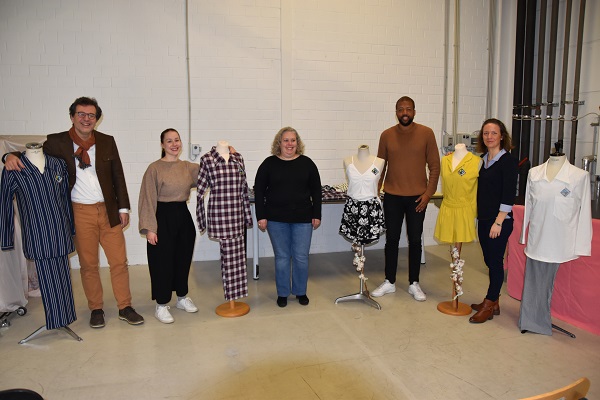 Credit: Fairtrade Lëtzebuerg
Credit: Fairtrade Lëtzebuerg
Local non-profit organisation Fairtrade Lëtzebuerg has announced the launch of a new fair trade pyjama range made in Luxembourg.
As part of the national awareness campaign "Rethink your Clothes", mandated by the Directorate for Development Cooperation and Humanitarian Affairs of Luxembourg's Ministry of Foreign and European Affairs, Fairtrade Lëtzebuerg joined forces with the Eva Ferranti workshop to develop the first Fairtrade Indian cotton pyjamas entirely created and made in Luxembourg.
Supporting local designers and promoting fair trade cotton is considered an important step in the development of a more ethical and sustainable textile sector in Luxembourg.
Fairtrade Lëtzebuerg decided to partner with Eva Ferranti's workshop, one of several local players which continue to promote "Made in Luxembourg" clothing in this day and age. The designer, who specialises in tailor-made and particularly high-end suits, has been an integral part of the Luxembourg landscape since the opening of her boutique in the Grand Duchy in 1999. During the COVID-19 crisis, the entrepreneur mobilised her 1,000 m2 production workshop in Bascharage to manufacture protective suits for Hôpitaux Robert Schuman. Now, the workshop is making Fairtrade certified cotton pyjamas.
During the launch, Eva Ferranti said she was pleased "to be a player in the Rethink your Clothes campaign and to be able to show that it is possible today to produce locally in a responsible manner with a positive environmental and social impact".
Through this collaboration, Fairtrade Lëtzebuerg aims to promote the craftsmanship that exists in the Grand Duchy, promote cotton from fair trade and develop local alternatives to allow members of the public to consume fashion differently.
"We are delighted with such a collaboration which combines fair trade and local in an exemplary way and which strengthens a textile production which had almost disappeared in Luxembourg", explained Jean-Louis Zeien, President of Fairtrade Lëtzebuerg.
Between the explosion in world demand for organic cotton, the surge in raw material prices and delivery problems, the sector must now face many challenges, noted the non-profit. Finding the right supplier in a global supply chain dominated by large multinational textile companies is all the more difficult for small designers. Hence the importance for Fairtrade Lëtzebuerg to support the designer in the search for a suitable fabric supplier.
In order to value rather than waste the natural and human resources that were necessary to manufacture the fabrics, Eva Ferranti's workshop has chosen for this project to work only with offcuts of Fairtrade cotton fabrics from a garment factory in Calcutta, India.
According to the non-profit, Fairtrade-certified cotton guarantees fair incomes and wages, decent working conditions and production that preserves natural resources and protects the health of populations. Fairtrade certified cotton also contributes to the empowerment of small producers and allows them to invest in community projects through the Fairtrade Premium. The Fairtrade movement now supports more than 45,000 people in the cotton sector, grouped together in 20 organisations of small producers in eight countries in Asia and Africa.
Fairtrade pyjamas by Eva Ferranti will be on sale at the Centre Lët'z Refashion in Luxembourg-Ville (Rue Aldringen, 1118 Luxembourg).








